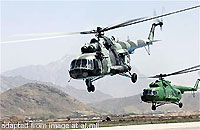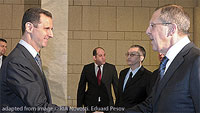Pentagon Defends Buying From Russia Trader Aiding Assad
Tony Capaccio, David Lerman - Bloomberg - bloomberg.com - 5.9.12 - JRL 2012-84
The Pentagon says it's in a bind, with nowhere to turn for helicopters needed by Afghanistan's air force except Russia, a top arms supplier to Syria's President Bashar al-Assad.

file photo
The U.S. Army has a $375 million contract to buy 21 Russian-made MI-17 helicopters for the Afghans from Rosoboronexport, Russia's state-run arms trader, Pentagon Undersecretary for Policy James Miller said in a previously undisclosed March 30 letter to a lawmaker opposed to the deal.
."The MI-17 acquisition effort is critical to building the capacity of Afghanistan security forces," Miller wrote. At the same time, he acknowledged "that Rosoboronexport continues to supply weapons and ammunition to the Assad regime" and "there is evidence that some of these arms are being used by Syrian forces against Syria's civilian population."

file photo The helicopter purchases undercut U.S. efforts at the United Nations to persuade Russia to stop supplying arms to the Assad regime, said Daryl Kimball, executive director of the Arms Control Association, a nonpartisan research group in Washington.
"It is an embarrassing dilemma," Kimball said yesterday in an interview. The U.S. should push for a UN arms embargo on Syria, he said.
The UN estimates that Assad's regime has killed more than 9,000 people since an uprising against his rule began, two months before the Pentagon contracted for the Russian-made helicopters. Secretary of State Hillary Clinton urged in August that nations doing business with Syria cut off trade and arms sales to Assad and "get on the right side of history."
Option for 12
The Army has taken delivery of nine of the helicopters for Afghanistan, with six more awaiting shipment and another six to be delivered by May 31. The U.S. has an option to buy an additional 12 Russian helicopters for the Afghans, who have been flying them for decades.
Vyacheslav Davidenko, a Rosoboronexport spokesman, had no comment when reached by telephone in Moscow.
U.S. commanders in Afghanistan concluded that the MI-17, one of the region's most widely used helicopters, is needed "after considering its proven operational capabilities in the extreme environments of Afghanistan," Miller said in the letter to Senator John Cornyn, a Texas Republican who's led opposition in Congress to the helicopter contract.
Tara Rigler, a Pentagon spokeswoman, said in an e-mail that Miller's letter is the most current comment on the subject.
Western Equipment
Avoiding the use of Russian-made choppers for Afghans "would require a kind of wholesale restructuring of their air force to shift to western equipment," said Stephen Flanagan, a national security analyst at the Center for Strategic and International Studies in Washington.
While the deal complicates U.S. efforts to broaden sanctions against Syria, Flanagan said, "the alternatives are even worse. I don't see any way out of it."
The choppers the Pentagon is purchasing for Afghanistan include full Western avionics, navigation, communications and situation-awareness capability. Each complete helicopter package costs $16.4 million, according to Army data.
The U.S. barred transactions with Rosoboronexport from 2006 to 2010, citing its arms sales to nations including Iran and Syria as violating efforts to curb proliferation of weapons of mass destruction. The sanctions were lifted in 2010, coinciding with Russia's support of a U.N. resolution expressing concern over Iran's nuclear program, according to the Congressional Research Service.
'Subsidizing Mass Murder'
Cornyn was one of 17 senators, including Democrats Ron Wyden of Oregon, Richard Durbin of Illinois and Benjamin Cardin of Maryland, who wrote Defense Secretary Leon Panetta March 12 criticizing the helicopter purchases.
U.S. taxpayers "should not be put in the position where they are indirectly subsidizing the mass murder of Syrian civilians," they said.
The helicopter deal is being used by human-rights advocacy groups that are pressing for Russia to halt arms sales to Syria.
"I urge you to stop the arms flow to Syria by canceling the U.S. contract with Rosoboronexport -- one of Syria's most significant enablers of mass atrocity," the New York-based group Human Rights First said in an online petition addressed to Panetta. The group said MI-17s could be purchased through brokers other than Rosoboronexport.
The U.S. in the past has turned to the Czech Republic and Slovakia to supply surplus MI-17 helicopters to Afghanistan, said Paul Holtom, director of the arms transfers program at the Stockholm International Peace Research Institute, in an e-mail.
Russia's Revenue
Russia stood to lose as much as $3.8 billion in revenue if it halted arms sales to Syria, the Russian newspaper Kommersant reported in August, citing estimates by the Center for Analysis of Strategies & Technologies in Moscow.
Rosoboronexport, based in Moscow, accounted for 85 percent of Russia's arms exports as of 2010, according to GlobalSecurity.org, a research group based in Alexandria, Virginia. It is the sole Russian company controlling exports of the MI-17, according to Miller.
The governments of Iraq and Pakistan also have asked the U.S. to supply them with MI-17s for counterterrorism missions, according to the Pentagon's inspector general.
Violence persists in Syria after the UN sent a team of cease-fire monitors to the country and pledged to expand their numbers. The observers were intended to calm the fighting so that talks could begin on implementing a peace plan drafted by United Nations special envoy Kofi Annan.
Syrian forces have used sniper fire and heavy weapons against civilians as part of their effort to crush the revolt against Assad.
©2012 BLOOMBERG L.P. ALL RIGHTS RESERVED; article also appeared at http://www.bloomberg.com/news/2012-05-08/pentagon-defends-buying-from-russia-trader-aiding-assad.html
Keywords: U.S.-Russian Relations - Russian News - Russia
The Pentagon says it's in a bind, with nowhere to turn for helicopters needed by Afghanistan's air force except Russia, a top arms supplier to Syria's President Bashar al-Assad.

file photo
The U.S. Army has a $375 million contract to buy 21 Russian-made MI-17 helicopters for the Afghans from Rosoboronexport, Russia's state-run arms trader, Pentagon Undersecretary for Policy James Miller said in a previously undisclosed March 30 letter to a lawmaker opposed to the deal.
."The MI-17 acquisition effort is critical to building the capacity of Afghanistan security forces," Miller wrote. At the same time, he acknowledged "that Rosoboronexport continues to supply weapons and ammunition to the Assad regime" and "there is evidence that some of these arms are being used by Syrian forces against Syria's civilian population."

file photo The helicopter purchases undercut U.S. efforts at the United Nations to persuade Russia to stop supplying arms to the Assad regime, said Daryl Kimball, executive director of the Arms Control Association, a nonpartisan research group in Washington.
"It is an embarrassing dilemma," Kimball said yesterday in an interview. The U.S. should push for a UN arms embargo on Syria, he said.
The UN estimates that Assad's regime has killed more than 9,000 people since an uprising against his rule began, two months before the Pentagon contracted for the Russian-made helicopters. Secretary of State Hillary Clinton urged in August that nations doing business with Syria cut off trade and arms sales to Assad and "get on the right side of history."
Option for 12
The Army has taken delivery of nine of the helicopters for Afghanistan, with six more awaiting shipment and another six to be delivered by May 31. The U.S. has an option to buy an additional 12 Russian helicopters for the Afghans, who have been flying them for decades.
Vyacheslav Davidenko, a Rosoboronexport spokesman, had no comment when reached by telephone in Moscow.
U.S. commanders in Afghanistan concluded that the MI-17, one of the region's most widely used helicopters, is needed "after considering its proven operational capabilities in the extreme environments of Afghanistan," Miller said in the letter to Senator John Cornyn, a Texas Republican who's led opposition in Congress to the helicopter contract.
Tara Rigler, a Pentagon spokeswoman, said in an e-mail that Miller's letter is the most current comment on the subject.
Western Equipment
Avoiding the use of Russian-made choppers for Afghans "would require a kind of wholesale restructuring of their air force to shift to western equipment," said Stephen Flanagan, a national security analyst at the Center for Strategic and International Studies in Washington.
While the deal complicates U.S. efforts to broaden sanctions against Syria, Flanagan said, "the alternatives are even worse. I don't see any way out of it."
The choppers the Pentagon is purchasing for Afghanistan include full Western avionics, navigation, communications and situation-awareness capability. Each complete helicopter package costs $16.4 million, according to Army data.
The U.S. barred transactions with Rosoboronexport from 2006 to 2010, citing its arms sales to nations including Iran and Syria as violating efforts to curb proliferation of weapons of mass destruction. The sanctions were lifted in 2010, coinciding with Russia's support of a U.N. resolution expressing concern over Iran's nuclear program, according to the Congressional Research Service.
'Subsidizing Mass Murder'
Cornyn was one of 17 senators, including Democrats Ron Wyden of Oregon, Richard Durbin of Illinois and Benjamin Cardin of Maryland, who wrote Defense Secretary Leon Panetta March 12 criticizing the helicopter purchases.
U.S. taxpayers "should not be put in the position where they are indirectly subsidizing the mass murder of Syrian civilians," they said.
The helicopter deal is being used by human-rights advocacy groups that are pressing for Russia to halt arms sales to Syria.
"I urge you to stop the arms flow to Syria by canceling the U.S. contract with Rosoboronexport -- one of Syria's most significant enablers of mass atrocity," the New York-based group Human Rights First said in an online petition addressed to Panetta. The group said MI-17s could be purchased through brokers other than Rosoboronexport.
The U.S. in the past has turned to the Czech Republic and Slovakia to supply surplus MI-17 helicopters to Afghanistan, said Paul Holtom, director of the arms transfers program at the Stockholm International Peace Research Institute, in an e-mail.
Russia's Revenue
Russia stood to lose as much as $3.8 billion in revenue if it halted arms sales to Syria, the Russian newspaper Kommersant reported in August, citing estimates by the Center for Analysis of Strategies & Technologies in Moscow.
Rosoboronexport, based in Moscow, accounted for 85 percent of Russia's arms exports as of 2010, according to GlobalSecurity.org, a research group based in Alexandria, Virginia. It is the sole Russian company controlling exports of the MI-17, according to Miller.
The governments of Iraq and Pakistan also have asked the U.S. to supply them with MI-17s for counterterrorism missions, according to the Pentagon's inspector general.
Violence persists in Syria after the UN sent a team of cease-fire monitors to the country and pledged to expand their numbers. The observers were intended to calm the fighting so that talks could begin on implementing a peace plan drafted by United Nations special envoy Kofi Annan.
Syrian forces have used sniper fire and heavy weapons against civilians as part of their effort to crush the revolt against Assad.